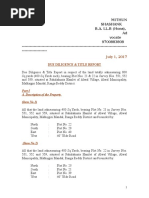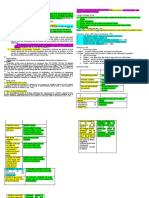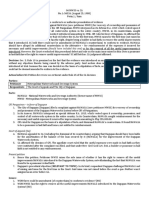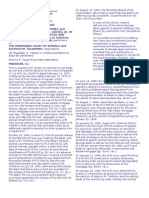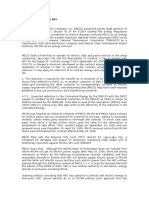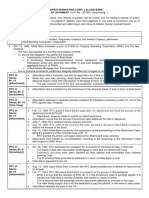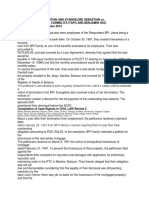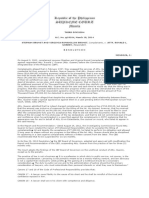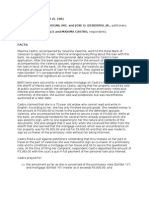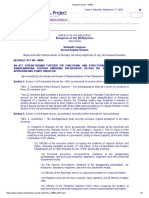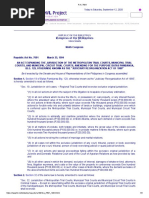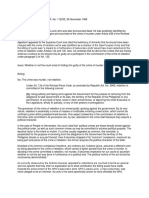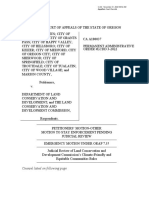Rural Bank of Caloocan vs. CA and Castro
Rural Bank of Caloocan vs. CA and Castro
Uploaded by
Hannika SantosCopyright:
Available Formats
Rural Bank of Caloocan vs. CA and Castro
Rural Bank of Caloocan vs. CA and Castro
Uploaded by
Hannika SantosOriginal Title
Copyright
Available Formats
Share this document
Did you find this document useful?
Is this content inappropriate?
Copyright:
Available Formats
Rural Bank of Caloocan vs. CA and Castro
Rural Bank of Caloocan vs. CA and Castro
Uploaded by
Hannika SantosCopyright:
Available Formats
Title Rural Bank of Caloocan, Inc. and Jose O. Desiderio, JR.
Ponente De Castro, J.
Doctrine
Facts Respondent Maxima Castro, a 70-year old widow who cannot read and write the
English language and can only speak Pampango dialect and that she only finished
second-grade was accompanied by Severino Valencia, went to the Rural Bank of
Caloocan to apply for an industrial loan. But it was Severino Valencia who arranged
everything about the loan with the bank and who supplied to the latter the personal
data required for Castro's loan application.
after the bank approved the loan for the amount of P3,000.00, Castro, accompanied
by the Valencia spouses, signed a promissory note corresponding to her loan in
favor of the bank.
Valencia spouses obtained a loan for P3,000.00. They signed a promissory note and
Castro affixed thereon her signature as co-maker.
The loans ere secured by a real-estate mortgage on Castro’s house.
The Sheriff of Manila sent a note of sale to Castro announcing that her property ould
be sold to satisfy the obligation of the promissory notes.
Castro immediately requested for postponement and learned for the first time that
the mortgage contract was for 6,000.00 and not for P3,000.00 and that she as
made to sign as co-maker without her consent.
Castro filed a suit against petitioner Bank and Spouses Valencia that thru mistake
on her part or fraud on the part of Valencias she was induced to sign as co-maker of
a promissory note and to constitute a mortgage on her house and lot to secure the
questioned note.
At the time of filing her complaint, respondent Castro deposited the amount of
P3,383.00 with the court a quo in full payment of her personal loan plus interest.
Castro prayed, amongst other, for the annulment as far as she is concerned of the
promissory note and mortgage insofar as it exceeds P3,000.00; for the discharge of
her personal obligation with the bank by reason of a deposit of P3,383.00 with the
court a quo upon the filing of her complaint; for the annulment of the foreclosure
sale of her property.
Contentions Petitioner Respondent
That originally, she needed money in the amount of
P3,000.00 to invest in the business of the defendant
spouses Valencia, who accompanied her to the
defendant bank for the purpose of securing a loan
of P3,000.00;
that while at the defendant bank, an employee
handed to her several forms already prepared which
she was asked to sign on the places indicated, with
no one explaining to her the nature and contents of
the documents;
that she did not even receive a copy thereof; that
she was given a check in the amount of P2,882.85
which she delivered to defendant spouses;
Lower Courts 1. Declared that the promissory note, Exhibit '2', is invalid as against plaintiff herein;
2. the contract of mortgage is null and void, in so far as the amount thereof exceeds
the sum of P3,000.00 representing the principal obligation of plaintiff
3. Annulled the extrajudicial foreclosure sale of the property
Appellate Affirmed in toto.
Court
Issue 1. Whether or not respondent court correctly affirmed the lower court in declaring the
promissory note invalid insofar as they affect respondent Castro vis-a-vis petitioner
bank, and the mortgage contract valid up to the amount of P3,000.00 only. (YES)
2. Who between Castro and the bank should suffer the consequences of the fraud
perpetrated by the Valencias.
SC Ruling While the Valencias defrauded Castro by making her sign the promissory note and the
mortgage contract, they also misrepresented to the bank Castro's personal qualifications in
order to secure its consent to the loan. This must be the reason which prompted the bank
to contend that it was defrauded by the Valencias.
Thus, as a result of the fraud upon Castro and the misrepresentation to the bank inflicted
by the Valencias both Castro and the bank committed mistake in giving their consents to
the contracts. In other words, substantial mistake vitiated their consents given. For if Castro
had been aware of what she signed and the bank of the true qualifications of the loan
applicants, it is evident that they would not have given their consents to the contracts.
Pursuant to Article 1342 of the Civil Code which provides:
Art. 1342. Misrepresentation by a third person does not vitiate consent,
unless such misrepresentation has created substantial mistake and the same
is mutual.
We cannot declare the promissory note valid between the bank and Castro and the
mortgage contract binding on Castro beyond the amount of P3,000.00, for while the
contracts may not be invalidated insofar as they affect the bank and Castro on
the ground of fraud because the bank was not a participant thereto, such may
however be invalidated on the ground of substantial mistake mutually
committed by them as a consequence of the fraud and misrepresentation
inflicted by the Valencias.
Who between Castro and the bank should suffer the consequences of the fraud perpetrated
by the Valencias?
It is evident that the bank was as much, guilty as Castro was, of negligence in giving its
consent to the contracts. It apparently relied on representations made by the
Valencia spouses when it should have directly obtained the needed data from
Castro who was the acknowledged owner of the property offered as
collateral. Moreover, considering Castro's personal circumstances – her lack of education,
ignorance and old age – she cannot be considered utterly neglectful for having been
defrauded. On the contrary, it is demanded of petitioners to exercise the highest order of
care and prudence in its business dealings with the Valencias considering that it is engaged
in a banking business –a business affected with public interest.
When the Valencias borrowed from the Bank a personal loan of P3,000.00 evidenced by a
promissory note and mortgaged Castro's property to secure said loan, the Valencias acted
for their own behalf. Considering however that for the loan in which the Valencias appeared
as principal borrowers, it was the property of Castro that was being mortgaged to secure
said loan, the Bank should have exercised due care and prudence by making proper inquiry
if Castro's consent to the mortgage was without any taint or defect.
You might also like
- 12 Rural Bank of Caloocan Vs Courts of AppealsDocument1 page12 Rural Bank of Caloocan Vs Courts of AppealsMarianne Hope VillasNo ratings yet
- Commissioner of Customs Vs ESSO Standard Eastern IncDocument1 pageCommissioner of Customs Vs ESSO Standard Eastern IncHannika Santos100% (1)
- Commissioner of Customs Vs ESSO Standard Eastern IncDocument1 pageCommissioner of Customs Vs ESSO Standard Eastern IncHannika Santos100% (1)
- Title Certificate.Document6 pagesTitle Certificate.Mithun Shashank100% (1)
- Evangelista and Co. Vs Estrella Abad Santos, G.R. No. L.31684, July 28, 1973-DIGESTEDDocument2 pagesEvangelista and Co. Vs Estrella Abad Santos, G.R. No. L.31684, July 28, 1973-DIGESTEDRaymer OclaritNo ratings yet
- Digest Kalilid Wood Industries CorporationDocument2 pagesDigest Kalilid Wood Industries CorporationJeannie Delfino-BoadoNo ratings yet
- Rem 1 225Document110 pagesRem 1 225MaanNo ratings yet
- de La Peña Vs Hidalgo, G.R. No. L-5486Document18 pagesde La Peña Vs Hidalgo, G.R. No. L-5486Jade ClementeNo ratings yet
- Cases Co OwnershipDocument141 pagesCases Co Ownershipeight_bestNo ratings yet
- PUNO - Amended and Supplemental PleadingsDocument5 pagesPUNO - Amended and Supplemental PleadingsadeeNo ratings yet
- Caption: Parts of A Pleading (Rule 7)Document21 pagesCaption: Parts of A Pleading (Rule 7)Don YcayNo ratings yet
- PHILIPPINE FEDERATION OF PETROLEUM WORKERS V CIRDocument2 pagesPHILIPPINE FEDERATION OF PETROLEUM WORKERS V CIROne TwoNo ratings yet
- Aquino V AureDocument1 pageAquino V AureeieipayadNo ratings yet
- Norkis Trading Corporation v. BuenavistaDocument2 pagesNorkis Trading Corporation v. BuenavistaJestherin Baliton0% (1)
- Legprof Canons 18-22Document9 pagesLegprof Canons 18-22beth_afanNo ratings yet
- Estate of Hilario Ruiz V. Ca GR. No. 118671 January 29, 1996 FactsDocument4 pagesEstate of Hilario Ruiz V. Ca GR. No. 118671 January 29, 1996 FactsVikki AmorioNo ratings yet
- ObliconDocument12 pagesObliconagent_rosNo ratings yet
- Commercial Law, Professors Sundiang and Aquino) : Common Form of Bill of ExchangeDocument11 pagesCommercial Law, Professors Sundiang and Aquino) : Common Form of Bill of ExchangeLizzy WayNo ratings yet
- Manila Metal Container Corporation VsDocument4 pagesManila Metal Container Corporation VsJackie CanlasNo ratings yet
- Diaz vs. Encanto GR No. 171303Document15 pagesDiaz vs. Encanto GR No. 171303Therese ElleNo ratings yet
- MARK Atrium Management Corp Vs CaDocument2 pagesMARK Atrium Management Corp Vs CaAllenNo ratings yet
- MWSS Vs CADocument2 pagesMWSS Vs CAKarez MartinNo ratings yet
- Philippine National Bank v. Court of Appeals, G.R. No. 57757 FactsDocument70 pagesPhilippine National Bank v. Court of Appeals, G.R. No. 57757 FactsJessie James YapaoNo ratings yet
- Reyes v. CADocument2 pagesReyes v. CAMina AragonNo ratings yet
- Sps. Yap vs. Sps. Dy, Et Al.Document4 pagesSps. Yap vs. Sps. Dy, Et Al.Jillian Asdala0% (1)
- G.R. No. 164051 Digested CaseDocument5 pagesG.R. No. 164051 Digested CaseAlheckzxsh DhannielNo ratings yet
- Pal Vs Ca FactsDocument4 pagesPal Vs Ca FactsChic PabalanNo ratings yet
- Keng Hua Paper Products Co vs. CADocument6 pagesKeng Hua Paper Products Co vs. CAcmv mendozaNo ratings yet
- 13 - Gonzalo L. Manuel & Co., Inc. vs. Central Bank 38 SCRA 524, No. L-20871 April 30, 1971Document8 pages13 - Gonzalo L. Manuel & Co., Inc. vs. Central Bank 38 SCRA 524, No. L-20871 April 30, 1971gerlie22No ratings yet
- Collection Agency AgreementDocument4 pagesCollection Agency AgreementCentSeringNo ratings yet
- Pasig Agricultural Development V Nievarez DigestDocument2 pagesPasig Agricultural Development V Nievarez DigestAlexis ArejolaNo ratings yet
- G. Merced v. Vda. de Merced 19 SCRA 423 GENE RevisedDocument2 pagesG. Merced v. Vda. de Merced 19 SCRA 423 GENE RevisedJoyce Sumagang ReyesNo ratings yet
- Mariano Vs CaDocument2 pagesMariano Vs CaRxx bNo ratings yet
- Citizens' League of Freeworkers And/Or Balbino Epis, Nicolas Rojo, Et Al. vs. Hon. Macapanton Abbas, Judge of The Court of First Instance of Davao and TEOFILO GERONIMO and EMERITA MendezDocument21 pagesCitizens' League of Freeworkers And/Or Balbino Epis, Nicolas Rojo, Et Al. vs. Hon. Macapanton Abbas, Judge of The Court of First Instance of Davao and TEOFILO GERONIMO and EMERITA MendezLizzette Dela PenaNo ratings yet
- Cornejo V CalupitanDocument2 pagesCornejo V CalupitanapbueraNo ratings yet
- Blue ArgumentsDocument11 pagesBlue ArgumentsIlanieMalinisNo ratings yet
- Gr. No. 177937Document3 pagesGr. No. 177937Robehgene Atud-JavinarNo ratings yet
- What Are The Tests To Determine Whether A Dispute Constitutes An Intra-Corporate Controversy and Dispute? How Would Jurisdiction Be Determined?Document16 pagesWhat Are The Tests To Determine Whether A Dispute Constitutes An Intra-Corporate Controversy and Dispute? How Would Jurisdiction Be Determined?Dominic EmbodoNo ratings yet
- Remedial Law Notes 1Document15 pagesRemedial Law Notes 1JoAnneGallowayNo ratings yet
- Central Bank v. CA, 139 SCRA 46 (1985)Document4 pagesCentral Bank v. CA, 139 SCRA 46 (1985)Fides DamascoNo ratings yet
- Aguilar v. Lightbringers Credit CoopDocument4 pagesAguilar v. Lightbringers Credit CoopMac Burdeos CamposueloNo ratings yet
- Manila Electric Co. vs. NORDEC Phil.Document13 pagesManila Electric Co. vs. NORDEC Phil.anonymous09140% (1)
- Rules AND Regulations Implementing Presidential Decree No. 851Document6 pagesRules AND Regulations Implementing Presidential Decree No. 851Joel G. Ayon100% (1)
- The Solicitor General For Plaintiff-Appellee. Trinidad, Reverente, Makalintal, Cabrera and Monsod Law Office For Accused-AppellantDocument3 pagesThe Solicitor General For Plaintiff-Appellee. Trinidad, Reverente, Makalintal, Cabrera and Monsod Law Office For Accused-Appellantapple jade licuananNo ratings yet
- Mactan Electic DigestDocument21 pagesMactan Electic DigestEmmanuel OrtegaNo ratings yet
- Piandiong Vs The Philippines (Case Summary)Document1 pagePiandiong Vs The Philippines (Case Summary)Ma. Fabiana GarciaNo ratings yet
- PEOPLE Vs GERONES (Digest)Document2 pagesPEOPLE Vs GERONES (Digest)NOLLIE CALISINGNo ratings yet
- 524 SCRA 290 - Labor Law - Labor Standards - Fixed-Term Employee Vs Regular EmployeeDocument1 page524 SCRA 290 - Labor Law - Labor Standards - Fixed-Term Employee Vs Regular EmployeeAkiNiHandiongNo ratings yet
- Paraguya V Crucillo DigestDocument1 pageParaguya V Crucillo DigestMickey OrtegaNo ratings yet
- Bar Questions: Atty. Paciano F. Fallar JR, SSCR-College of LawDocument6 pagesBar Questions: Atty. Paciano F. Fallar JR, SSCR-College of LawMai RodrigoNo ratings yet
- Aguete V. Philippine National Bank G.R. No. 170166, (April 6, 2011) DoctrineDocument8 pagesAguete V. Philippine National Bank G.R. No. 170166, (April 6, 2011) DoctrineRai-chan Junior ÜNo ratings yet
- 10 Oropeza V Allied BankDocument4 pages10 Oropeza V Allied BankmeriiNo ratings yet
- Tagle Vs CADocument2 pagesTagle Vs CAattyalanNo ratings yet
- Articles of Partnership Limited June2015Document4 pagesArticles of Partnership Limited June2015Regina MuellerNo ratings yet
- PRISMA CONSTRUCTION V MANCHAVEZDocument2 pagesPRISMA CONSTRUCTION V MANCHAVEZmaria graceNo ratings yet
- Murillo Assignment SpecproDocument6 pagesMurillo Assignment SpecproPaul Arman MurilloNo ratings yet
- Sebastian Vs BpiDocument3 pagesSebastian Vs Bpiangel locsin100% (1)
- Ujano vs. RepublicDocument5 pagesUjano vs. RepublicAira Mae LayloNo ratings yet
- Position Paper (For The Respondents) : I. PartiesDocument8 pagesPosition Paper (For The Respondents) : I. PartiesGerry MalgapoNo ratings yet
- Alcantara v. de VeraDocument3 pagesAlcantara v. de VeraCzarina CidNo ratings yet
- Fermin Vs BedolDocument1 pageFermin Vs BedolDon AmboyNo ratings yet
- A.C. No. 10164Document2 pagesA.C. No. 10164Rose Ann VeloriaNo ratings yet
- Rural Bank of Caloocan vs. CADocument3 pagesRural Bank of Caloocan vs. CAElaine Atienza-Illescas100% (5)
- Atong Paglaum CaseDocument21 pagesAtong Paglaum CaseHannika SantosNo ratings yet
- Republic Act No. 10660 (Amended RA 8249) PDFDocument3 pagesRepublic Act No. 10660 (Amended RA 8249) PDFHannika SantosNo ratings yet
- Bank of The Philippine Islands vs. Sarabia Manor Hotel Corporation, G.R. No. 175844, 29 July 2013Document3 pagesBank of The Philippine Islands vs. Sarabia Manor Hotel Corporation, G.R. No. 175844, 29 July 2013Hannika SantosNo ratings yet
- Ra 11057Document10 pagesRa 11057Hannika SantosNo ratings yet
- G.R. No. L-75079 (Buaya Vs Polo) PDFDocument2 pagesG.R. No. L-75079 (Buaya Vs Polo) PDFHannika SantosNo ratings yet
- R.A. 6770 (Ombudsman Law) PDFDocument8 pagesR.A. 6770 (Ombudsman Law) PDFHannika SantosNo ratings yet
- R.A. 8249 (Jurisdiction of Sandiganbayan) PDFDocument4 pagesR.A. 8249 (Jurisdiction of Sandiganbayan) PDFHannika SantosNo ratings yet
- R.A. 7691 (Expanded Jurisdiction of Firrst Level Courts) PDFDocument3 pagesR.A. 7691 (Expanded Jurisdiction of Firrst Level Courts) PDFHannika SantosNo ratings yet
- G.R. No. 229781 (Delima V Guerrero) PDFDocument34 pagesG.R. No. 229781 (Delima V Guerrero) PDFHannika SantosNo ratings yet
- G.R. No. 158763 (Miranda Vs Tuliao)Document11 pagesG.R. No. 158763 (Miranda Vs Tuliao)Hannika SantosNo ratings yet
- G.R. No. 99289-90 (Santiago Vs Vasquez)Document8 pagesG.R. No. 99289-90 (Santiago Vs Vasquez)Hannika SantosNo ratings yet
- G.R. No. 163866 (Olivarez V CA) PDFDocument13 pagesG.R. No. 163866 (Olivarez V CA) PDFHannika SantosNo ratings yet
- Moreno vs. San Sebastian Recoletos, 28 March 2008Document2 pagesMoreno vs. San Sebastian Recoletos, 28 March 2008Hannika SantosNo ratings yet
- G.R. No. 163586 (Castro Vs Deloria) PDFDocument5 pagesG.R. No. 163586 (Castro Vs Deloria) PDFHannika SantosNo ratings yet
- Homeowners Association of Talayan Villge Vs JM Tuason, GR No. 203883, 10 Nov 2015Document2 pagesHomeowners Association of Talayan Villge Vs JM Tuason, GR No. 203883, 10 Nov 2015Hannika SantosNo ratings yet
- People vs. Evangelista G.R. No. 36277, 26 October 1932Document2 pagesPeople vs. Evangelista G.R. No. 36277, 26 October 1932Hannika SantosNo ratings yet
- Malicdem Vs Marulas Industrial Corp., 23 Feb 2011 PDFDocument8 pagesMalicdem Vs Marulas Industrial Corp., 23 Feb 2011 PDFHannika SantosNo ratings yet
- 117 - People vs. Lovedioro, G.R. No. 112235, 29 November 1995Document2 pages117 - People vs. Lovedioro, G.R. No. 112235, 29 November 1995Hannika Santos100% (1)
- Sherman Ave Lease AgreementDocument4 pagesSherman Ave Lease AgreementAbhi AbhiNo ratings yet
- BBB v. AAADocument18 pagesBBB v. AAAMokeeCodillaNo ratings yet
- The Enlightenment in EuropeDocument6 pagesThe Enlightenment in Europeapi-311017794No ratings yet
- Ramiscal Vs SandiganbayanDocument17 pagesRamiscal Vs SandiganbayanMichael LagundiNo ratings yet
- AMLA HandbookDocument13 pagesAMLA Handbookclcornerstone defenseNo ratings yet
- Motion - Stay Previous JudgmentOrderDocument396 pagesMotion - Stay Previous JudgmentOrderKGW NewsNo ratings yet
- Balbir Kaur Vs Presiding Officer-Cum-Sdm and ... On 25 October, 2016Document2 pagesBalbir Kaur Vs Presiding Officer-Cum-Sdm and ... On 25 October, 2016Raj PathakNo ratings yet
- CRPC Research Paper - 4th SemesterDocument30 pagesCRPC Research Paper - 4th SemesterVijay Srinivas KukkalaNo ratings yet
- REMMAN Raised The Defense That He Adopted Measures To Contain The Waste Water Coming From Its Piggery To Prevent Any Damage To The Adjoining EstatesDocument6 pagesREMMAN Raised The Defense That He Adopted Measures To Contain The Waste Water Coming From Its Piggery To Prevent Any Damage To The Adjoining EstatesJoshua ParilNo ratings yet
- 40 NCR-SF050 - Complaint FormDocument4 pages40 NCR-SF050 - Complaint FormRodrigo AbanNo ratings yet
- Undertaking of Ethics and IntegrityDocument5 pagesUndertaking of Ethics and IntegrityadityaNo ratings yet
- Jasmine Wiley Vs MaywoodDocument6 pagesJasmine Wiley Vs MaywoodMichaelRomainNo ratings yet
- ACC 143 BMBE FormDocument2 pagesACC 143 BMBE FormSherina Mae GonzalesNo ratings yet
- Petition For BailDocument3 pagesPetition For BailAzrael CassielNo ratings yet
- Unit 1 - LL 2 - 3Document24 pagesUnit 1 - LL 2 - 3Hegde2626No ratings yet
- Crim Law 2Document6 pagesCrim Law 2Sepha PagdangananNo ratings yet
- Court of Appeal Act No 7 of 2016Document14 pagesCourt of Appeal Act No 7 of 2016talk2marvin70No ratings yet
- Maxims of Equity: 1. Equity Will Not Suffer A Wrong To Be Without RemedyDocument8 pagesMaxims of Equity: 1. Equity Will Not Suffer A Wrong To Be Without Remedysaman salamNo ratings yet
- Supreme Court Final Verdict by Justice AtugubaDocument48 pagesSupreme Court Final Verdict by Justice Atugubapaa kwasi otchereNo ratings yet
- Hot Topics InHouse Counsel 2019 eCHB PDFDocument503 pagesHot Topics InHouse Counsel 2019 eCHB PDFwelkynNo ratings yet
- Central Bank Employees Vs BSP DigestDocument6 pagesCentral Bank Employees Vs BSP DigestEmmanuel Ortega100% (2)
- CMP Mobilizers AccreditationDocument4 pagesCMP Mobilizers AccreditationJayson De LemonNo ratings yet
- Draft A Lease Deed For Lease of A Immovable PropertyDocument3 pagesDraft A Lease Deed For Lease of A Immovable PropertyBusiness Law Group CUSBNo ratings yet
- Farida Yap Bitte V Sps JonasDocument2 pagesFarida Yap Bitte V Sps JonasBeverlyn Jamison67% (3)
- Tamilnadu National Law School Tiruchirapalli: Family Law Ii Wills and WillingsDocument14 pagesTamilnadu National Law School Tiruchirapalli: Family Law Ii Wills and WillingsSeeralan Venugopalan0% (1)
- Hyderabad Atiyat Inquiries Rules 1952Document6 pagesHyderabad Atiyat Inquiries Rules 1952Prajkta BhaleraoNo ratings yet
- Addis Ababa University School of Law: Group AssignmentDocument10 pagesAddis Ababa University School of Law: Group Assignmentasnakew ewunetuNo ratings yet
- Cisg Case StudyDocument3 pagesCisg Case Studyramanand kadamNo ratings yet
- PHD Level Dissertation LawDocument440 pagesPHD Level Dissertation LawarshadtabassumNo ratings yet


